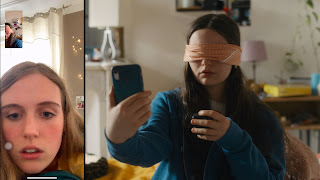Three years on from his excellent Zombi Child, Bertrand Bonello returns with his latest feature, Coma, which screens today and tomorrow as part of the London Film Festival. The film serves as the final instalment of the director's loose trilogy on youth which began with 2016's Nocturama, and it's a strangely moving affair; there's an added poignancy from the fact that it features the late Gaspard Ulliel's last performance. Compared with its two predecessors, Coma is something of a scaled-down work, which isn't too surprising when you learn that it was made during lockdown. As with a number of other filmmakers, Bonello has used the constraints imposed by COVID-19 to his advantage, with the necessarily smaller canvas leading the director to some fine creative choices. Perhaps unsurprisingly, screen technology—which, during lockdown, gave so many of us a much-needed window to the world—is at the centre of Coma, as its bedroom-bound main character looks to connect with others.
That protagonist, impressively played by Bonello's Zombi Child star Louise Labèque, is a nameless teenage girl grappling with one of the early lockdowns enforced by France as COVID spread around the world. We observe her as she spends her days glued to various screens, in the process catching up with her friends via Zoom calls and taking in various YouTube clips. Her attention is drawn to one influencer in particular, Patricia Coma (Julia Faure), a rather disconcerting presence whose videos cover a range of topics, although she's frequently seen peddling the Revelator, an electronic toy that will be instantly familiar to everyone who has ever played memory skill game Simon. The girl is soon in possession of one of these devices, although it's not clear how she obtained it; as the long days allow our protagonist to master the game's lengthy, complex sequences, it appears that the Revelator may have a purpose beyond simply testing short-term memory.
Among this sea of gadgets, however, there is a refreshingly analogue activity in the form of an ongoing stop-motion melodrama performed by the girl's Barbie dolls (voiced by the likes of Bonello alumni Ulliel and Louis Garrel), whose story is punctuated by eerie, inappropriate canned laughter that brings to mind the anthropomorphic rabbits of David Lynch's Inland Empire. Yet Coma's strangest passages emerge when the girl goes to sleep, as during the night she is transported to an unsettling twilight world, one largely populated by the dead. Patricia Coma, who as far as we know is still alive, can also be spotted in this realm; moreover, the YouTuber tells the girl that this is the only location where it's possible to exercise free will. With this in mind, it really does appear that, as Brian Molko of Placebo once sang, "the only place you're truly free is cosy in your dreams".
Clocking in at just 80 minutes, Coma is as modest temporally as it is spatially. It is, however, a deceptively slight affair in which Bonello manages to cover a great deal of ground, with subjects ranging from climate change and COVID to the roles both technology and Gen Z will play in the planet's future. With its multiple ways of facilitating its protagonist's escape from the restrictions brought about by the pandemic, Bonello's endearingly hopeful film skilfully captures the essence of what it was like to be a zoomer in lockdown. For many of us during that time, the world got so much smaller—yet it can be argued that teenagers were among the most tech-savvy, and as such were well-equipped to rapidly identify ways in which to get a sense of the world beyond the proverbial four walls. Sincerely presented as a letter to Bonello's teenaged daughter, Coma is a haunting, memorable conclusion to a fine trilogy.
Darren Arnold
Images: BFI





